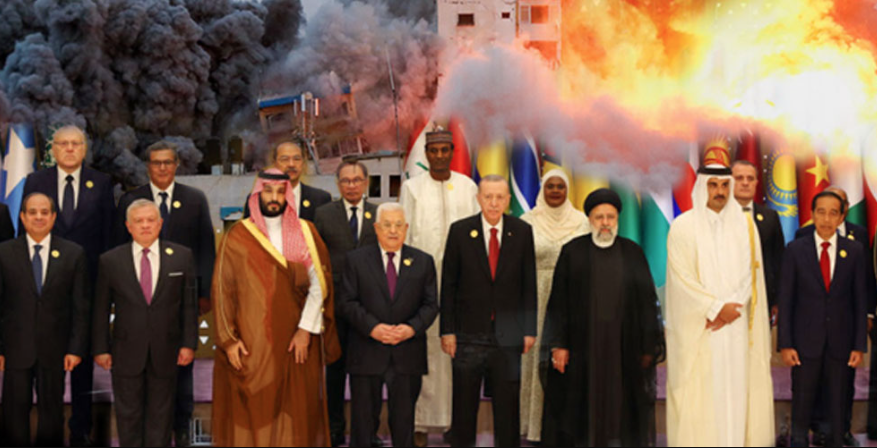
Conflict in the Gaza Strip threatens to derail the diplomatic advances with Israel made by the Gulf States over recent years and spill into all-out conflict, threatening the interests of the United States and its partners while empowering Iran: Gulf International Forum/NAJ screen shot
Guest Column –
By Curtis Seltzer –
The butchery in Israel and Palestine creates an opportunity to find a viable peace through fairness. Imagination, leadership and boldness are required to recast the ways they exist with each other.
Reverting to the antebellum “stability” of Israel’s West Bank occupation and Gaza ghettoization will produce more Palestinians dedicated to eradicating Israel. Stability of that sort guarantees escalating conflict.
A two-state solution is not likely to be much different because it’s not likely to solve the core issues of land ownership and land use that fuel the wars. A demilitarized Palestine overseen by Israel is not a state.
The two-state “solution” was conceived in 1947 when the United Nations proposed dividing Palestine unfairly. Arabs, who far outnumbered Jews and owned most of Palestine, were to get 42 percent of the land; Jews, 56 percent. Jerusalem and Bethlehem were to become an international zone.
Jews supported the UN plan. Palestinians and Arab neighbors did not. The plan was imposed without a local referendum.
From wars in 1967 and 1973, Israel now either owns or controls to varying degrees all of what was to be divided in 1947 and more.
Over seventy-five years, the region has split asymmetrically into a sovereign state and a bifurcated reservation. This is a rump two-entity solution that solves nothing and breeds escalating violence.
Israel is a garrison state whose governing coalitions over the years preferred intermittent bloodshed and occasional wars to a peace that reverses its territorial expansion and ends military control over Palestinians.
The United States enables Israel to pursue this policy through military aid, more than $3.8 billion in 2023. We participate in the conflict along with Iran and its frontline proxies.
Bifurcated Palestine is a less-than functional entity that is occupied or controlled by its enemy. Occupation, ghettoization and repression fuel Palestinian hatreds that support terrorists and future wars.
A sovereign Palestine would have the right to create a full-scale military in anticipation of war with Israel. That prefigures an interstate war that could ensnare everyone.
The current situation—either before October 7 or after—shows that neither side can win what it wants. Israel cannot kill its way to peace; Hamas cannot terrorize its way to eliminating Israel.
The alternative is a one-state secular solution that brings together Palestinian and Israeli territories and people with all religions protected.
It would be based on equal rights and obligations for all citizens, democratic institutions, checks and balances, an impartial legal system, protection for minorities, and agreed-on methods for integrating former enemies. Both Jews and Palestinians would have a right of return.
More than two million Palestinians hold Israeli citizenship that does not provide in practice the same rights, obligations, benefits and opportunities that Jews have. Despite second-class circumstances, they have developed ways to get along. Jews and Palestinians can coexist when conditions are set up for success.
The critical issue is reconfiguring land ownership with as much fairness as possible.
The first step is the hardest. A consortium of affected parties—Israel, Palestine, United States, Russia, neighbors and regional states, including Iran and its proxies—would develop a plan. The alternative to negotiations is continued instability and butchery. The alternative to negotiations is an eventual Israeli loss.
All have a common interest in a fair peace and a self-interest in eliminating the prospect of future wars. Multilateral negotiations are always fraught, but deals can emerge when they are better than other options.
Those who fund the war machines of Israel and the Palestinians would refocus their aid to reconstruction, development and remedying wrongs.
Central to one state is the establishment of a Land Fund.
Israelis who now occupy or own Palestinian/Arab property in Israel and occupied territories would be offered fair-market value. They could use the money to either relocate or buy ownership from willing Palestinian claimants.
If they refuse to accept FMV, that money would be given to descendant Palestinians to be used for substitute land purchases and housing. It might take three decades to remedy seventy-five years of history. Imperfect as it is, this approach offers a way to resolve the dispute over land.
The consortium could also begin establishing a regional common market however the parties define and organize it.
It is hard to change religions in conflict, but it is possible to change the distribution of land that triggers chronic bloodshed.
Status quo before October 7 and a two-state solution do not resolve the land issue. A one-state solution based on equity would have to.
Stability based on fairness is likely to last. Stability based on guns will not.
A one-state, secular democratic solution does not guarantee an end to conflict. What it provides are systems that do not currently exist to protect everyone and resolve disputes.
A one-state solution would have its own problems given the region’s history. But it offers a path to less killing and, maybe, peace.
The antebellum arrangement and a two-state solution do not.
___
Curtis Seltzer is a writer, land consultant and arbitrator. He has a Ph.D. from Columbia University where he studied international relations and American foreign policy. He has no financial interest in this piece or its position. Like many Americans, he says he believe fairness is the most promising path to peace between Israel and the Palestinians. He was bar mitzvahed in 1958 at Pittsburgh’s Tree of Life congregation. He does not practice any religion and have not since high school.
___
If you support truth in reporting with no paywall, and fearless writing with no popup ads or sponsored content, consider making a contribution today with GoFundMe or Patreon or PayPal.














The author doesn’t consider the fact that Palestinian inclination is towards islamism. Israel cannot abide another terror state in its backyard. Palestinians had a chance to create a state in Gaza. They destroyed the greenhouses Israel gave them and voted in Hamas. 80% of Palestinians favor Hamas and support the massacre of Israelis. They don’t want a state. They want Israel to cease to exist. The author’s arguments are facile at best and dangerous at worst.